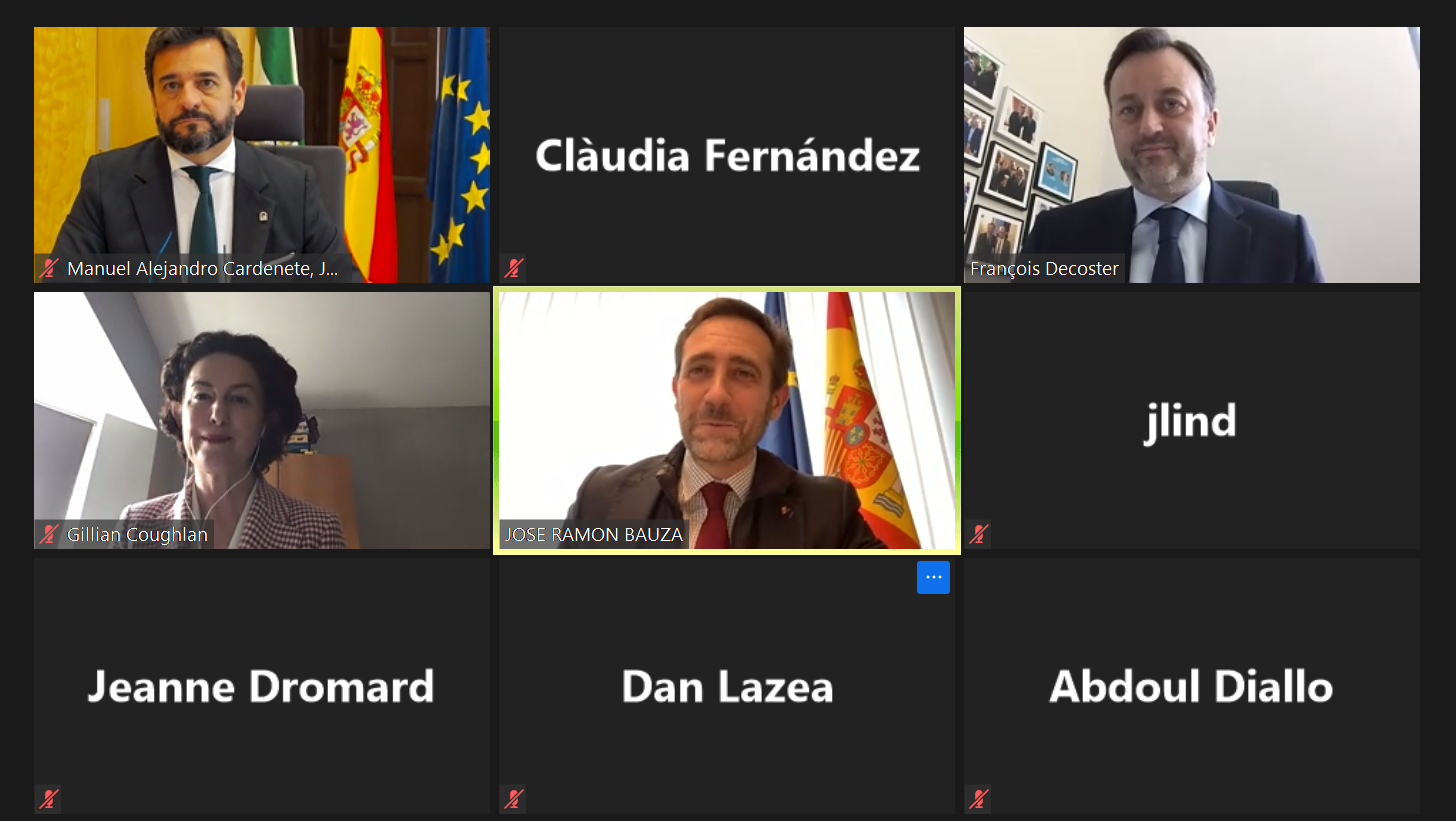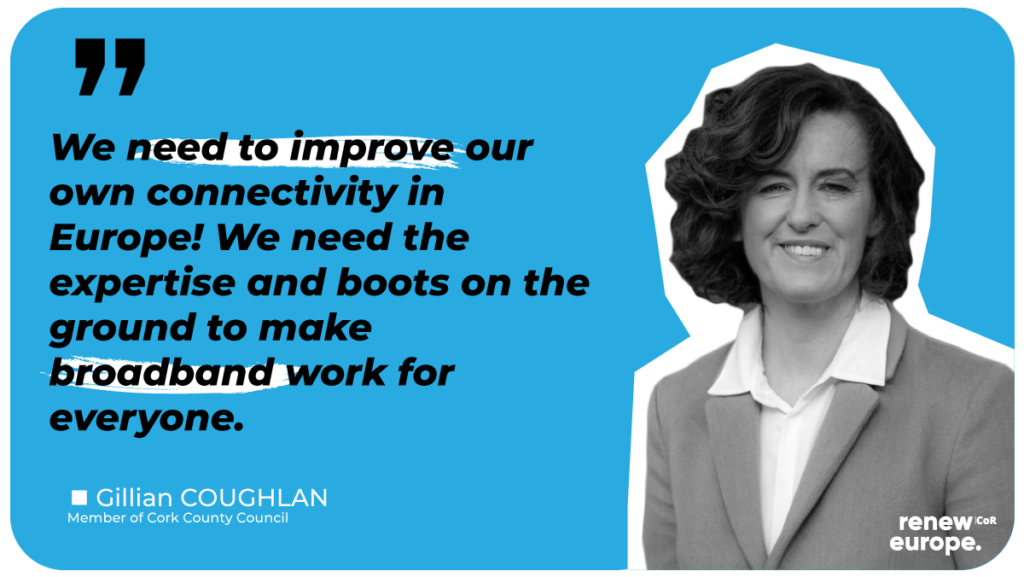This article was published under the 2020-2025 European Committee of the Regions mandate.
Last updated 15 December 2021
2021
December
Members of the European Committee of the Regions were invited to represent the EU’s regions and cities at the yearly European Education Summit organised by the European Commission on 9 December. This provided an opportunity to underline the essential contribution of local and regional authorities to developing high-quality digital education and skills, to reinforcing active European citizenship and to responding to future challenges in the field of education and training.
In the panel on Future education trends and developments, Gillian Coughlan, Member of Cork County Council, underlined the need to address the impact of Covid-19 pandemic on education and learners. “Morale in schools is very low, among teachers and students. Covid weariness is pervasive and we adults can sometimes forget that young people are so much more constrained than we are, they now feel as if the whole world is saying ‘no’ to them much of the time”, explained Ms Coughlan, who is teacher herself.
Ms Coughlan warned against the demotivating impact of online learning and pointed out that some students risk falling out of the formal education system. “So more resources need to be concentrated on students’ mental health and on integrating recreation in to the school day, safely. Every school should have a home-school liaison officer who can guide students and guardians through challenging times”, she suggested.
October
Gillian Coughlan, Mayor of Cork, and a teacher herself, discussed the place of the teachers at the heart of the European education area during a Renew Europe webinar with Ilana Cicurel MEP.
Other participants of the webinar on 28 October 2021 included Mariya Gabriel, European Commissioner for Innovation, research, Culture, Education and Youth, Jean Michel Blanquer, French Minister of National Education, Li Andersson, Finish Minister of Education and Culture, among others.
Coughlan argued that “COVID-19 was a shock to every section of society, including very vividly in the education sphere. Suddenly, students and teachers had to stay at home to learn and teach from home. In the school where I teach, we were fortunate that a major investment in technology had recently been made. If we have to place education and teachers at the heart of Europe, and at the heart for Europe, we must link teachers with each other, and continue to inspire them to up-skill and adapt their methodologies to the rapidly changing society in which we live”.
Coughlan called for physical education hubs to be established in university cities so that teachers across the educational system can continue in-service quality and professional development. While being physical hubs, the digital element will obviously also be available. Focusing on the shortage of teachers in her home country, Coughlan supported offering teachers an attractive pay package. “Today in Ireland younger teachers are on a lower pay scale than more senior colleagues. This is an appalling scenario and a disincentive to young people. If teachers and education are the heart or at the heart of education, then investment are the lungs, feeding education to lead to clear benefits: well-educated, happy students entering the workforce. The more we invest in education, the more we invest in the future.I’m pleased that access to digital devices has now become a right in the EU – as a member of the broadband platform, I’ve been calling for digital cohesion – parity to access to broadband, as well access to hard- and software, should be a right.”

June
On 10 June 2021, the rapporteur spoke during the OECD conference on “Digital education for a strong recovery: A forward looking approach”.
May
Adopted at the European Committee of the Regions Plenary
20 April
During a briefing exchange on the Digital Green Certificate between Renew Europe members from the CoR and the Renew Europe group in the European Parliament, Gillian Coughlan raised the Erasmus programme in educational programmes to Ramón BAUZÁ MEP:
“In 2019, 11,319 Irish people took part in the Erasmus programme, so I acknowledge the enormous benefit that this programme affords pupils, students, trainees and educators across the European Union. The Covid 19 pandemic interrupted the experience for many students. The Digital Green Certificate will assist people who are interested in participating in the Erasmus programme in future.”
 21 January
21 January
CoR re-launches CoR-EC Broadband Platform to discuss connectivity and digital transformation: In 2017, the Committee of the Regions and the European Commission jointly launched the Broadband Platform with the aim to help high-speed broadband reach all European regions, including rural and sparsely populated areas where there is not enough market-driven development. Since then, the Platform has been a key instrument in making the voice of local and regional authorities heard through the important added value of the CoR and its members, feeding into the European Commission’s policy-making process. In view of the twin transformation on green and digital, the upcoming digital decade and the challenges posed by the Covid-19 pandemic, the mandate of the Broadband Platform is more important than ever today.
During the 2021 kickoff meeting, Gillian Coughlan (Fianna Fáil) highlighted the need to fous on connectivity for European citizens. As a teacher, she saw how during the previous lockdown, students couldn’t connect online to follow their classes or do their homework!
 Discussion with EPP CoR Member Borboly who is Rapporteur on European Skills Agenda for sustainable competitiveness, social fairness and resilience
Discussion with EPP CoR Member Borboly who is Rapporteur on European Skills Agenda for sustainable competitiveness, social fairness and resilience
2020
December
18 December
Discussion on the digital education plan with Georgi Dimitrov, Acting Head of Unit “Innovation and EIT”.
14 December
Discussion on the digital education plan with Mrs. Janine Costa, Education Attaché, (Coordination Education, Youth and Sports) – Portuguese Presidency and her colleagues
10 December
As a speaker, the rapporteur participated in the “3rd education summit: High-level Panel Education and training fit for a digital and green 21st century” which was also attended by European Commissioner Gabriel, MEP Negrescu and the Ministers Celaa Dieguez (ES), Velcovsky (CZ) and Fuchs (HR). Coughlan’s main message was that “the student’s voice needs to be heard when creating a digital education ecosystem, as they are very vocal about their need to learn together, so while there is a clear need to equip technically and skill-wise all teacher and students, we should not forget about the physical environment and it’s importance”.
2 December
Speaker at the Public Hearing of the CULT Committee of the European Parliament: “The education package: aims, challenges and prospects for success”. Her main message: “the importance of ensuring the requisit teacher qualifications, supported and certified throughout the EU in accordance with the same guidelines. Moreover, cross-border cooperation between universities for this purpose should be prioritised under the available EU funds.”
November 2020
Gillian Coughlan appointed as rapporteur for the Digital Education Action Plan.
Prior to her appointment as rapporteur, Gillian Coughlan, as representative of the European Committee of the Regions on the European Broadband Platform, spoke at a high-level online eventt ending the public consultation on the New Digital Education Action Plan for Europe. Speaking shortly after the introductory remarks of the European Commission’s Executive Vice-President Margrethe Vestager, who is responsible for the EU’s digital policies, Coughlan urged the Commission’s Vice-President to create a level playing field for every European student and teacher, and highlighted a message that she has emphasized repeatedly at EU level: “Access to broadband is a huge problem all across the Union. Teachers had to drastically change their methods when the COVID19 pandemic hit us, but many schools and teachers were not prepared to switch to digital. Thousands of students have lost out and that is why it is so essential to put in place the digital infrastructure that will give all students and teachers equal chances to prosper and develop their skills.”
Gillian COUGHLAN
RapporteurDownload the opinion
Media corner
Gillian Coughlan (@fiannafailparty raised connectivity for EU citizens during the #Broadband platform kickoff. As a teacher, she saw in the lockdown how students couldn’t connect online or do homework! Discover her #digital #education plan for Europe: https://t.co/49RRXeb3ZE pic.twitter.com/s1DEyy4GWE
— Renew Europe CoR (@RenewEuropeCoR) January 21, 2021
.@dragos_pislaru (@RenewEurope) with @baljeuj @Juanjo_mlozano & Gillian Coughlan assess chances for recovery and resilience in Europe: https://t.co/6iIuGieO90!
— Renew Europe CoR (@RenewEuropeCoR) January 26, 2021

